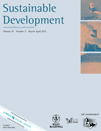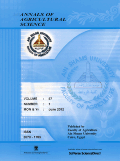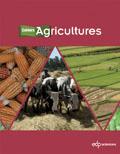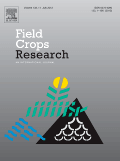
Journal of Agriculture and Environment for International Development
Scope & Guideline
Navigating the Path to Sustainable Development Together
Introduction
Aims and Scopes
- Sustainable Agricultural Practices:
The journal emphasizes research that promotes sustainable farming techniques, such as conservation agriculture, agroecology, and the use of organic inputs, to enhance productivity while minimizing environmental impacts. - Climate Change Adaptation:
A significant focus on understanding how agricultural systems can adapt to the challenges posed by climate change, including studies on crop resilience, water management, and the socio-economic implications for farming communities. - Rural Development and Livelihoods:
Exploration of the socio-economic dynamics affecting rural populations, with research that addresses the relationship between agricultural practices and community well-being, income generation, and food security. - Technological Innovations in Agriculture:
Investigation into the adoption and impact of new agricultural technologies and practices, such as the use of mycorrhizal inoculation, precision farming techniques, and alternative crop management strategies. - Biodiversity and Ecosystem Services:
Research that highlights the importance of biodiversity in agricultural systems, including studies on indigenous practices and the role of traditional knowledge in enhancing ecosystem services.
Trending and Emerging
- Impact of Climate Change on Agriculture:
An increasing number of studies are focusing on the effects of climate change on agricultural systems, including crop yield sensitivity and adaptation strategies, underscoring the urgency of addressing climate-related risks. - Water Management and Irrigation Strategies:
Research on innovative irrigation techniques and water management practices is gaining traction, particularly in water-scarce regions, to enhance agricultural productivity and sustainability. - Socio-Economic Impacts of Agriculture:
There is a growing interest in exploring the socio-economic dimensions of agriculture, including farmer well-being, market participation, and the role of agricultural policies in shaping livelihoods. - Biodiversity Conservation in Agricultural Systems:
Emerging studies are increasingly focusing on the conservation of biodiversity within agricultural landscapes, examining how traditional practices and agroecological approaches contribute to ecosystem health. - Use of Biotechnology and Novel Inputs:
Research exploring the application of biotechnology, such as the use of nanoparticles and other innovative inputs, to improve crop resilience and productivity is becoming more prevalent.
Declining or Waning
- Traditional Agricultural Practices:
Research on purely traditional agricultural methods is becoming less frequent as there is a growing emphasis on integrating modern techniques and innovations to address contemporary agricultural challenges. - Single Crop Studies:
There is a noticeable decline in studies focusing solely on single crop systems, as the journal increasingly favors research that examines multi-crop systems and their benefits for sustainability and resilience. - Generalized Economic Analyses:
While economic analysis remains relevant, there is a shift away from generalized studies towards more nuanced, context-specific economic evaluations that consider local conditions and diverse farming systems.
Similar Journals

SUSTAINABLE DEVELOPMENT
Fostering Interdisciplinary Dialogue for Lasting ImpactSUSTAINABLE DEVELOPMENT is a premier academic journal published by WILEY, dedicated to the dynamic fields of Development, Renewable Energy, and Sustainability. With a strong commitment to advancing knowledge, this journal holds an impressive impact factor that places it in the Q1 quartile in both the Development and Renewable Energy categories for 2023, underscoring its significant influence in the social sciences. Boasting a Scopus rank of 4th out of 306 in Development and 26th out of 270 in Renewable Energy, it reflects a high level of scholarly excellence and relevance, achieving percentiles of 98th and 90th, respectively. Established in 1993, and set to continue through 2024, the journal serves as a crucial platform for researchers, professionals, and students to share groundbreaking insights and foster interdisciplinary dialogue. Although not an open-access journal, it offers a wealth of essential research that addresses the pressing challenges of sustainable development, contributing to a more sustainable future.

ANNALS OF AGRICULTURAL SCIENCES
Pioneering Research in the Heart of AgricultureANNALS OF AGRICULTURAL SCIENCES, published by Elsevier, stands as a leading open access journal dedicated to the multifaceted field of agricultural sciences. Since its inception in 2011, this journal has served as a pivotal platform for the dissemination of high-quality research, covering areas such as agronomy, animal science, horticulture, food science, plant science, and soil science. With an impressive Q1 ranking across multiple disciplines and notable positions in Scopus Ranks—including #6 in Animal Science and Zoology and #3 in Horticulture—this journal is recognized globally for its significant contribution to advancing agricultural innovations. The journal caters to a diverse audience of researchers, professionals, and students, providing them with open access to cutting-edge studies that address critical issues in agricultural productivity and sustainability. Its commitment to high-impact research ensures that articles contribute meaningfully to the scientific community, fostering advancements in agricultural practices and policies.

CAHIERS AGRICULTURES
Connecting researchers to shape agricultural practices.CAHIERS AGRICULTURES is a distinguished open-access journal published by EDP Sciences S A, focusing on the vital fields of Agronomy and Crop Science, Animal Science and Zoology, as well as Management, Monitoring, Policy, and Law. With an ISSN of 1166-7699 and an E-ISSN of 1777-5949, this journal has notably maintained a strong presence in the academic landscape since its establishment, covering a wide range of topics pertinent to agricultural sciences. Based in France, CAHIERS AGRICULTURES fosters collaboration and knowledge sharing among researchers and practitioners through its open-access model, which has been in effect since 2014. The journal is recognized for its rigorous peer-review process, reflected in its competitive Scopus rankings, which place it in the Q2 quartile for both Agronomy and Crop Science, and Animal Science and Zoology. Researchers and scholars are encouraged to contribute cutting-edge findings that may influence agricultural practices and policy development. With a vision to advance sustainable agricultural practices, CAHIERS AGRICULTURES stands as a critical resource for advancing scientific knowledge and informing stakeholders in the agricultural sector.

FIELD CROPS RESEARCH
Driving Change in Agronomy with Peer-Reviewed ExcellenceFIELD CROPS RESEARCH is a premier academic journal published by Elsevier, dedicated to advancing knowledge in the fields of Agronomy and Crop Science as well as Soil Science. Now in its 46th year of publication, this esteemed journal has established itself as a leading resource, holding a prestigious Q1 ranking in both the Agronomy and Soil Science categories, with a remarkable blend of rigorous peer-reviewed research and innovative findings. With a Scopus ranking of #27/406 in Agronomy and #20/159 in Soil Science, and a notable 93rd and 87th percentile respectively, FIELD CROPS RESEARCH plays a vital role in informing practices that drive sustainable agriculture and optimize crop production. Although not an open access journal, it remains highly accessible to the global research community and offers critical insights that influence policy and agricultural practices worldwide. Researchers, professionals, and students are encouraged to delve into this journal, as it continues to shape the future of field crop research through impactful studies and comprehensive reviews.

Advances in Agriculture
Exploring New Frontiers in Agricultural ScienceAdvances in Agriculture is a prominent Open Access journal dedicated to the dissemination of high-quality research in the fields of agriculture, agronomy, animal science, food science, and soil science. Published by HINDAWI LTD from the United Kingdom, this journal has made significant strides since its inception in 2014, contributing to the advancement of agricultural knowledge and practices. With an impressive impact factor reflected in its tiered quartile rankings, notably Q2 in Agricultural and Biological Sciences (miscellaneous), Agronomy and Crop Science, and Animal Science and Zoology, it serves as a key platform for innovative research and applied science. The journal aims to provide researchers, professionals, and students with rich access to groundbreaking studies that can help shape sustainable agricultural practices and policies. Emphasizing a global audience, Advances in Agriculture promotes an inclusive dialogue among scholars to tackle contemporary challenges in agriculture, enhancing food security and environmental stewardship worldwide.

Agronomy for Sustainable Development
Driving Change in Agronomy for a Sustainable WorldAgronomy for Sustainable Development, published by SPRINGER FRANCE, is a leading international journal dedicated to advancing the field of agronomy and sustainable practices. With its ISSN 1774-0746 and e-ISSN 1773-0155, this esteemed journal plays a pivotal role in disseminating cutting-edge research and innovative solutions that address critical challenges in agriculture and environmental engineering. Achieving remarkable rankings in Scopus—specifically, 19th out of 406 in Agronomy and Crop Science and 22nd out of 197 in Environmental Engineering—underscores its prestige, with a remarkable 95th and 89th percentile respectively. The journal is open access, promoting broader dissemination of knowledge, and welcomes contributions that foster sustainable agricultural practices and enhance environmental stewardship. As an essential resource for researchers, professionals, and students, Agronomy for Sustainable Development serves as a platform for interdisciplinary collaboration aimed at nurturing resilient agricultural systems and promoting sustainability worldwide.

Economia Agraria y Recursos Naturales
Exploring Sustainable Solutions for Agriculture and NatureEconomia Agraria y Recursos Naturales, published by UNIV POLITECNICA VALENCIA, EDITORIAL UPV, is a prominent open-access journal that has been serving the fields of agricultural and biological sciences, environmental science, and geography since 2001. With an ISSN of 1578-0732 and an E-ISSN of 2174-7350, this journal is dedicated to publishing high-quality research that contributes to the sustainable management of natural resources and agricultural practices. The journal invites scholars, practitioners, and students to explore and share innovative findings that address pressing environmental challenges. While currently categorized in the lower quartiles (Q4) for various disciplines in 2023, its open-access model ensures wide dissemination and visibility for authors and their work, aligning with the growing trend towards accessibility in academic publishing. Positioned in Spain, Economia Agraria y Recursos Naturales is a valuable resource for those seeking to engage with the intersection of agriculture, environmental studies, and policy planning within a global context.

AGROCIENCIA
Connecting scholars to cultivate impactful agricultural insights.AGROCIENCIA, published by COLEGIO POSTGRADUADOS, is a key journal in the fields of agronomy, animal science, and environmental science in Mexico. With an ISSN of 1405-3195 and an E-ISSN of 2521-9766, this journal has been a crucial platform for disseminating research findings since its inception in 2000. Operating from Montecillo, Estado Mexico, it provides an outlet for scholars and practitioners to share innovations and insights that directly impact agricultural practices and environmental sustainability. Despite its current categorization in the Q4 quartile across multiple disciplines, AGROCIENCIA strives to elevate the quality and reach of research, fostering a collaborative approach to tackle pressing issues within the agricultural sciences. Access options are primarily through institutional subscriptions, allowing for a diverse audience of researchers, professionals, and students to engage with the latest studies aimed at advancing knowledge in the agricultural sector. As the journal converges towards its 2024 milestone, it remains dedicated to enhancing scientific inquiry and promoting effective solutions within its discipline.

JOURNAL OF AGRICULTURAL AND RESOURCE ECONOMICS
Championing open access to vital economic insights.Journal of Agricultural and Resource Economics is a pivotal platform in the realm of agricultural and resource economics, published by the Western Agricultural Economics Association. Since its inception, the journal has embraced an Open Access model, fostering widespread dissemination of research findings to benefit both scholars and practitioners in the field. The journal operates within an impressive global ranking framework, resting in Q2 across several pertinent categories including Agronomy and Crop Science, Animal Science and Zoology, and Economics and Econometrics. With its ISSN 1068-5502 and E-ISSN 2327-8285, it has garnered attention for its rigorous academic standards and impactful contributions to the discourse on resource management and agricultural practices. Researchers, professionals, and students alike will find the journal's ongoing commitment to advancing knowledge invaluable, with publications that span from 1996 to 2024 capturing evolving trends and insights in the sector.

International Journal of Agricultural Sustainability
Fostering Interdisciplinary Solutions for Sustainable AgricultureThe International Journal of Agricultural Sustainability, published by Taylor & Francis Ltd, is a leading platform for researchers and professionals in the field of agricultural science, economics, and sustainability. With an impact factor that reflects its strong academic credibility and contribution to the field, the journal has earned esteemed rankings, including Q1 in Agronomy and Crop Science and Q2 in Economics and Econometrics for 2023. Engaging an audience keen on advancing sustainable agricultural practices, the journal has embraced Open Access since 2023, facilitating broader dissemination of vital research findings. With Scopus ranks placing it in the top quartiles and percentiles within its categories, the International Journal of Agricultural Sustainability aims to foster interdisciplinary dialogue and innovative approaches to agricultural sustainability, making it an essential resource for students, researchers, and industry professionals alike.